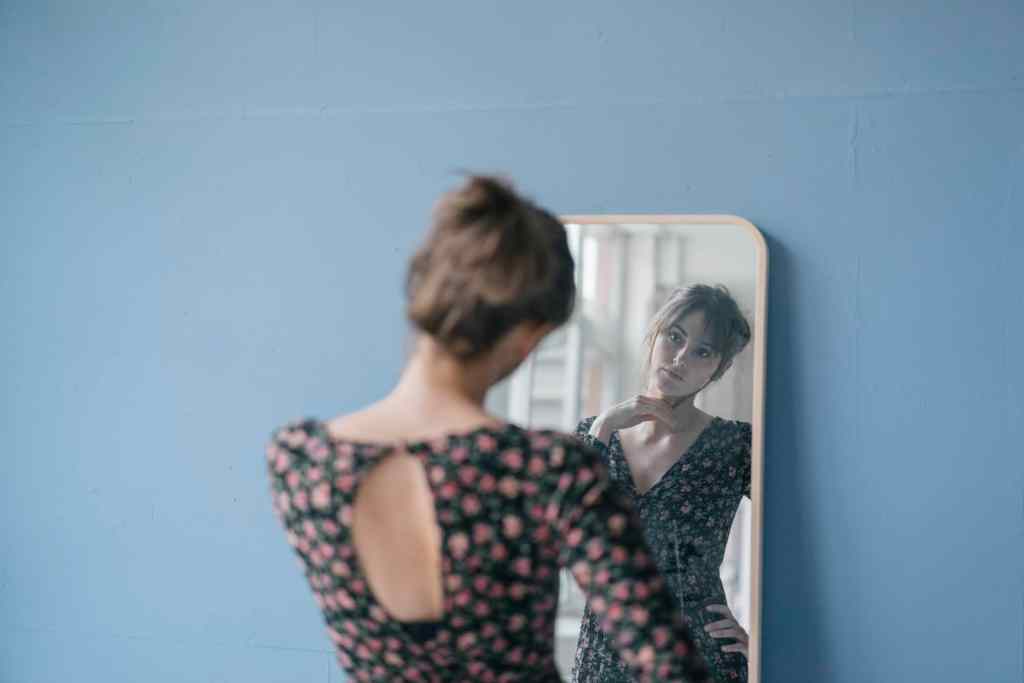
- POPSUGAR Australia
- Fitness
- 6 Signs That You Could Have Body Dysmorphia, According to a Therapist
6 Signs That You Could Have Body Dysmorphia, According to a Therapist

Diet culture is pervasive, and when you’re constantly surrounded by messages that suggest your body isn’t good enough, it’s easy to feel insecure. But at what point do issues with body image turn into body dysmorphia? Body dysmorphia can cause you to obsess over your perceived flaws, but “[it] is not in itself a diagnosis,” Marina Harris, PhD, a fellow at the National Center of Excellence for Eating Disorders (NCEED), told POPSUGAR. “Symptoms of body dysmorphia can be present in anyone or across diagnoses like anorexia, bulimia, etc.”
When you think of those who are most likely to struggle with body dysmorphia or disordered eating, you may picture young, thin, overwhelmingly white women. But in many cases, marginalized communities are more likely to live with eating disorders, and they often face additional barriers in getting diagnosed. If you’re worried that you or a loved one may be experiencing body dysmorphia, keep reading for the most common symptoms and some helpful tips from Dr. Harris. For more resources, visit the NCEED’s website.
You See Your Body Differently Than Others See It
People with body dysmorphia often have a distorted view of their bodies. “You might hear people say that other people say their body is one way, but they just don’t see it. Or they see themselves as larger than others see them,” Dr. Harris said.
What Can Help
Describe your body in nonjudgmental, objective terms. “Instead of saying, ‘My face is fat,’ say that ‘My face has an oval or heart shape,'” Dr. Harris explained. “When we make judgments about ourselves, they’re not accurate – especially when we have body dysmorphia and don’t see our body as others do.”
Remember, feelings aren’t facts. If you’re struggling with these self-criticisms, you might talk also to a therapist, who can help you spot unhelpful thought patterns and develop skills to cope with them.
You Often Ask Others For Reassurance About Your Body
“People with body dysmorphia may frequently ask others for reassurance that their perceived body ‘defect’ is invisible to others. This can alienate people and make the distorted beliefs stronger in the long term,” Dr. Harris told POPSUGAR. In other words, if you start to make people uncomfortable, they may begin to dodge your questions – which may only make may feel more confident that something is wrong.
What Can Help
“Engage with others around things that are important to you instead of asking others to comment on your body,” Dr. Harris said. “Having others comment on your body can strengthen the associations with body parts and self-worth, so we want to de-pair those associations.”
Instead of making any references to your body, talk about something you watched recently, or ask your friend or loved one how they’re doing at work or in school. You can also do something fun together to take your mind off whatever’s brewing inside.
You're Dissatisfied With Your Body and Try to Change It
“People with body dysmorphia are dissatisfied with their bodies, or a part of their bodies. You might see people who are hyper-focused on their lips, or arms, or legs,” Dr. Harris said. “They engage in efforts to change these body parts by engaging in compulsive exercise, surgery, or other methods used to change certain body parts. This can cause significant distress and anxiety, another symptom.”
Note that this means body dysmorphia isn’t just about the size of a person’s body. The distortion can center on any part of the body, and people may try to “fix” it in a variety of ways – some of which are dangerous.
What Can Help
Body image is a tough topic for many people, and body positivity doesn’t always work or feel right for everyone. If that’s true for you, you might try practicing body neutrality instead. You can do this by “describing your body in objective, nonjudgmental ways and focusing on the functionality of your body – what your body can do, instead of how it looks,” Dr. Harris said. She explained that body neutrality aims to normalize the idea that no one really has to love their body. “Our bodies are vessels and not something that we need to love or hate,” she said.
Your Concerns About Your Body Interfere With Daily Functioning
People with body dysmorphia may avoid social interactions because they fear others will judge the part of their body they dislike. “Body dysmorphia can interfere with how people live their life if they allow the dysmorphia to hold them back from activities they enjoy,” Dr. Harris explained. Giving into these anxieties can only further fuel your fear.
What Can Help
While you may feel like you want to avoid others, it’s important that you push yourself. “Don’t skip on dinner with your family because you’re worrying about your weight. Go out with your friends. Do things that help you engage in your life, even when you don’t feel like it,” Dr. Harris said. “Most people think that they need to wait for motivation to strike in order to do pleasant activities in their life, but that simply isn’t true – more often the opposite is true, that we need to engage in the activity first.”
You Spend Time Trying to Hide or Cover Your Perceived Flaws
“People with body dysmorphia may wear unusually baggy clothes, spend lots of time covering up perceived defects with makeup or other means, or may cover up their bodies in other ways,” Dr. Harris said. “They may avoid certain activities that expose their perceived defects, which ends up interfering with their lives. People with body dysmorphia might also spend time consulting with doctors or professionals on ways to change their perceived defects.”
If you have body dysmorphia, you may spend a lot of time trying to “fix” a part of your body or feel better about it. It can consume you to the point that it disrupts your daily life.
What Can Help
Just as you still need to go out and be in the world, you also need to do the opposite of what your mind is telling you here. “When you have urges to hide your flaws, act opposite – which doesn’t mean that you need to highlight them more, but avoid trying to cover them up,” Dr. Harris said. Pushing yourself out of your comfort zone and seeing that everything is OK can be beneficial. You’re strong, and you can do this!
You "Check" Your Body Often
“Body checking is characterized by repetitive and time-consuming behaviors that allow one to ‘check’ the way their body is experienced,” Dr. Harris told POPSUGAR. “Unfortunately, because body dysmorphia is characterized by distortion and how one experiences their body, efforts to engage in body checking often end up confirming the belief that there’s something wrong with certain body parts.”
While body checking may feel helpful in the moment, it only harms you further. When you have body dysmorphia, you aren’t able to see your body as it actually is, even after looking at it for a long period of time.
What Can Help
“Avoid engaging in body checking by doing the opposite of the body checking action,” Dr. Harris said. “For example, when you find yourself picking up your arm to pinch your skin, do the opposite of the body checking action by putting your arm down. You may consider hiding mirrors temporarily until you can work on your body checking enough to walk by mirrors without engaging in checking out your body.”
This is yet another example of opposite action, a dialectical behavior therapy skill. It helps you make more helpful choices when you’re tempted to engage in a harmful behavior.







